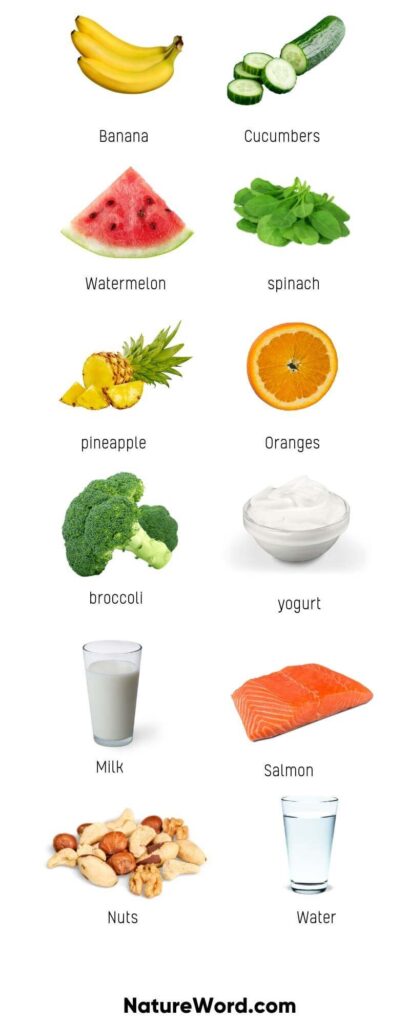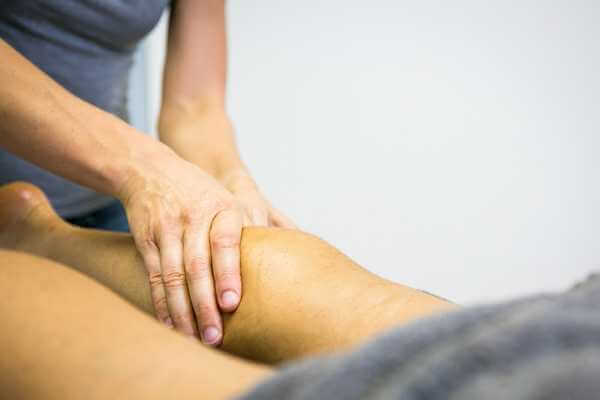Many people have experienced muscle cramps at some point – a frustrating and painful experience. While no one food can prevent muscle cramps 100%, consuming the right foods can help minimize your risk.
Causes of Muscle Cramps
Several different factors can contribute to muscle cramps. Dehydration is one of the most common causes, as it can lead to electrolyte imbalances. Electrolytes, such as potassium, sodium, and calcium, are essential for muscle function. When they become depleted, it can cause muscles to contract involuntarily.
Overuse is another common cause of muscle cramps. When muscles are used repetitively or for extended periods, they can become tired and start to cramp. This is often seen in athletes participating in long-distance running or other endurance sports.
Foods for Prevention Muscle Cramps

Several different foods can help prevent muscle cramps. The most important are those high in potassium, magnesium, and calcium.
Let’s look at foods that are shown to prevent muscle cramping:
1.Bananas
Bananas are a good source of potassium, an essential electrolyte for muscle function. Potassium helps to regulate nerve impulses and muscle contractions. A lack of potassium can lead to muscle cramps, so you must ensure you’re getting enough in your diet.
Bananas are also a good source of magnesium, another vital mineral for muscle function. Magnesium helps to relax muscles and prevent cramping.
2.Cucumbers
Cucumbers are a good source of potassium and magnesium, making them ideal for preventing muscle cramps. They are also a good source of water, which can help keep you hydrated and prevent dehydration-related cramping.
3.Watermelon
Watermelon is a good source of potassium, magnesium, and calcium. Calcium is another electrolyte that is essential for muscle function. It helps to regulate muscle contractions and prevent cramping.
Watermelon is also a good source of water, which can help keep you hydrated and prevent dehydration-related cramping.
4.Spinach
Spinach is a good source of magnesium and calcium. It also contains oxalates, which have been shown to help reduce muscle cramping.
5.Pineapple
Pineapple is a good source of magnesium and calcium. It also contains bromelain, an enzyme that has anti-inflammatory properties. Bromelain has been shown to help reduce muscle soreness and inflammation.
6.Oranges
Oranges are a good source of potassium and magnesium. They also contain vitamin C, an antioxidant that can help reduce inflammation.
7.Broccoli
Broccoli is a good source of magnesium, calcium, and vitamin C. It also contains sulforaphane, a compound that has been shown to help reduce muscle cramping.
8.Yogurt
Yogurt is a good source of magnesium, calcium, and potassium. It also contains live and active cultures, which can help improve gut health.
9.Milk
Milk is a good source of calcium and potassium. It also contains vitamin D, which is vital for bone health.
10.Salmon
Salmon is a good source of magnesium and potassium. It also contains omega-3 fatty acids, which have anti-inflammatory properties.
11.Nuts
Nuts are a good source of magnesium, calcium, and potassium. They are also a good source of healthy fats, which can help reduce inflammation.
12.Water
Water is essential for hydration and helps to prevent dehydration-related cramping. It is also a good source of electrolytes, such as potassium, sodium, and calcium.
Properties in Foods That Prevent Muscle Cramping
The following nutrients are proven to help prevent or reduce muscle cramping:
Potassium
Bananas are one of the most popular and well-known potassium-rich foods. Just one medium banana contains 422 mg of potassium – over 10% of the Daily Value (DV).
Leafy green vegetables, such as spinach and Swiss chard, are also excellent sources of potassium. One cup of cooked Swiss chard provides almost 950 mg of potassium, while one cup of cooked spinach has close to 840 mg.
Cantaloupe is another good option when it comes to potassium-rich foods. Just one cup of cantaloupe contains over 540 mg of potassium – that’s over 12% of the DV.
Magnesium
Almonds are a great source of magnesium, with one ounce providing around 80 mg of the mineral.
Cashews are another excellent option, as one ounce of cashews contains 74 mg of magnesium.
Pumpkin seeds are also a good source of magnesium, with one ounce providing around 37 mg.
Quercetin
Onions are a rich source of quercetin, with one cup containing over 2 mg of the compound.
Apples are another excellent source, with one medium apple providing around 1.5 mg of quercetin.
Berries, such as blueberries and strawberries, are also excellent sources of quercetin. One cup of fresh blueberries provides close to 3 mg of quercetin, while one cup of fresh strawberries has close to 2 mg.
Calcium
Calcium-rich foods such as dairy products, tofu, and dark leafy greens
Dairy products, such as milk and yogurt, are excellent sources of calcium. One cup of milk contains around 300 mg of calcium – over 25% of the DV.
Making sure you’re getting enough calcium regularly can help prevent muscle cramps. Eating a balanced diet that includes a variety of fruits, vegetables, and whole grains is the best way to ensure that you’re getting all the nutrients your body needs—in addition to staying hydrated by drinking plenty of fluids throughout the day.
Additional Measures
There are a few other measures that you can take to help prevent muscle cramps.
For example, wearing compression garments during exercise can help to improve blood circulation and reduce the risk of cramping.
Additionally, certain supplements, like magnesium or potassium, can help prevent muscle cramps.
Foods That Trigger Muscle Cramps
Muscle cramps can be triggered by several factors, including dehydration, electrolyte imbalance, and overuse. However, diet plays a significant role in the development of muscle cramps. Here are some foods that may trigger muscle cramps:
Foods High in Salt
Dehydration is a common and potentially serious condition when the body loses more fluids than it takes in. While many factors can cause dehydration, one of the most common is overexposure to salt. When the body is exposed to salt, it retains water to compensate for the high sodium levels.
This can lead to dehydration, as the body cannot correctly process the excess water. In addition, dehydration can cause muscle cramps. As the body tries to conserve water, blood flow to the muscles is reduced, leading to cramping. For these reasons, it is vital to be aware of the risks of overexposure to salt and take steps to avoid dehydrating.
Caffeinated Beverages
Caffeine is a diuretic that causes the body to produce more urine. This can lead to dehydration, as the body loses more fluids than it takes in. Dehydration can, in turn, lead to electrolyte imbalance, as the body loses essential minerals such as sodium and potassium.
Dehydration and electrolyte imbalance can contribute to muscle cramps, as they interfere with the muscles’ ability to contract and relax properly. Therefore, it is crucial to be aware of the potential risks of consuming caffeine, especially if you are exercising or working in hot conditions.
Sugary Foods
Sugar is a significant energy source for the body, but it can also cause problems if consumed in excess.
An electrolyte imbalance is one of the most severe issues from eating too much sugar. This occurs when the level of minerals in the blood becomes artificially high or low, and it can lead to various problems, including muscle cramps.
When there is an electrolyte imbalance, the muscles cannot function properly and may cramp up as a result. This can be extremely painful and can make it difficult to move. Consume sugar in moderation and drink plenty of fluids to avoid an electrolyte imbalance.
By avoiding foods that trigger muscle cramps, you may reduce the frequency and severity of these painful episodes.
Treatment for Muscle Cramps

A muscle cramp can happen to anyone, even if they are in good health and have been eating a healthy diet. There are a few things you can do if you experience a muscle cramp:
- Try to massage the muscle or apply pressure to This can help to relax the muscle and relieve the pain.
- Apply heat or cold to the Applying heat or cold to the area can also help to reduce pain and discomfort.
- Stretch the muscle Gently stretching the muscle can also help to reduce the cramping.
- You can take a pain reliever such as ibuprofen. However, you should only take this as a last resort as it can have side effects.
If you experience a muscle cramp, don’t panic. You can do a few things to relieve the pain and discomfort. However, if the pain is severe, you may want to consult with a doctor to rule out any underlying medical conditions.
The Bottom Line
No one food can prevent muscle cramps 100%, but eating the right foods can prevent muscle cramps. Bananas, dark leafy greens, and yogurt are some of the best foods to avoid muscle cramps. These foods have properties that help to prevent muscle cramping.
You can also take additional measures to help prevent muscle cramps, such as staying hydrated and warming up before strenuous activity. If you experience frequent muscle cramps, treatment is available and should be discussed with a healthcare professional.
